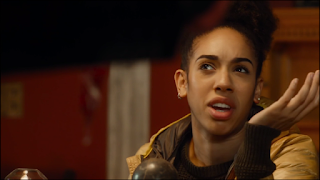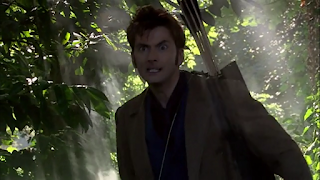Shortly after her episode aired, Dollard tweeted about what a great evening she had had, thanking friends and family and even the man on twitter who had decried the "SJW"s writing Doctor Who. For those readers who don't know (as the only reader I intend to send this to is you, Tom I doubt there are any who don’t know) the internet "debate" over the "SJW" label is perhaps the most puerile and imbecilic going on at the moment. “SJW” stands for “Social Justice Warrior” and is used on people who display concern over issues of social justice. “SJW” is either a damning label used to silence those speaking out about such issues mocking them and suggesting that they are only discussing them as a badge of hollow moral superiority whilst “SJW”s may give themselves the label as a symbol of pride and moral superiority. So whilst genocide is being committed against homosexual people in certain parts of the world, as extremists march throughout the Middle-East massacring the locals and using rape as a weapon of terror, as Donald Trump threatens nuclear war against North Korea, as international cooperation falls apart through nationalism and misplaced senses of pride and as our world boils in its tiny, fragile atmospheric shell the most important issue for some people is complaining over whether or not a Doctor Who writer points out that racism existed in Regency England. And I continue to tap away at this keyboard analysing a family tea-time television show.
I am of the opinion that Dollard’s commitment to showing Bill’s concerns and horrible treatment is a work of authenticity. It always struck me as peculiar that Micky wasn’t carted off when he visited pre-Revolutionary France or that Martha wasn’t stoned in the streets of Elizabethan London. It’s not some hollow crusade to point out that black people might have had a hard time of it in the past. It is writing period drama. Revered Scottish writer Robert Louis Stevenson once wrote a short story about a black man coming to a small village, symbolising the coming of the Devil. If white people were the children of God, then black people, their “inverse” must be the children of Satan. It is ignorance or it is racism or it is both, the point is, it is history.
Dollard doesn’t solely rely on Bill’s melanin to give her a less than comfortable time this week. I was pleased, after two episodes of light hearted banter and mutual understanding that the Bill/Doctor relationship strayed into more strained territories. Perhaps more effectively than Cottrell-Boyce last week we are shown Bill’s ideals come into question. For an audience who has spent 13 years with the Doctor we know that he must often resort to violence in order to achieve his ends and morally we are usually on his side. For the Capaldi Doctor, who began his era potentially pushing a (sort-of) person out of a hot air balloon, and who couldn’t tell the difference between the ages of a school girl and her teacher it makes sense for him to have little trouble with the death of a child, stopping only to pluck his sonic screwdriver from the boy’s dead fingers but for Bill this is horrific. The ensuing conflict is well written because it feels so natural. Occasionally, in the show when a companion falls out with the Doctor the conflict feels contrived (see Series 8 and Clara for full details) but it’s a signal of the elegance of Dollard’s writing that both the Doctor and Bill are understandably in the right and understandably in the wrong.
I was particularly interested in seeing what Sarah Dollard would do with her second trip behind the TARDIS controls because her first script Face the Raven had been so important to the series 9 arc. In Face the Raven I had felt that she had been slightly short changed as a significant part of her run time was put aside for the death of Clara and the continuation of the Mayor Me story-line. Beyond that I was really impressed with the offbeat nature of her science-fantasy imagination. I loved the imaginative ways that she found to show the Doctor and crew investigating the Trap Street, visiting libraries, hanging out of the TARDIS, the investigation wasn’t just confined to the dialogue but she found an engaging variety of ways in which to show it going on as well. Whilst in some episodes the mystery is resolved through dialogue akin to Doctor House’s scientific hypothesis, experiment, discard approach, her episodes have both involved physical investigation. The Doctor and Bill are taken from the lowest rungs of society with the street urchins, up to the highest rungs of society in the home of Lord Sutcliffe. Their investigation takes them from a work house to the tents of the Frost Fair to the watery depths beneath the River Thames.
I was reminded strongly of the classic series story The Talons of Weng Chiang which is a story which so blatantly puts the Doctor into the role of detective that he is dressed up as Sherlock Homes. In many ways I think that Dollard as a writer could be suited to the classic series format of 4, 20 minute episodes so strong is the variety of her storytelling and the strength of her character writing. In fact, the biggest problem that I had with the episode is that some of the aspects were painted a little too broadly. Lord Sutcliffe, for one, is a character, so completely nasty that he is hardly believable. If Dollard could have had an extra few minutes of run-time to show him in different situations rather than just shouting at black women and trying to commit mass-slaughter, I’m sure she could have drawn out a few more layers to his character. Maybe we could have had some scenes of Sutcliffe showing his public face, maybe he’s a local hero for bringing business and entertainment to this dreary part of London. Perhaps we could have seen him alone with the Doctor or alone with Bill to contrast the manner in which he interacts with them. This isn’t a criticism of Dollard’s writing, it’s actually a commendation of the raw creativity that she brings to the show. I sincerely hope that she is invited back when Chibnall takes over.
I’m having great fun with Doctor Who this year, perhaps that is because of the show’s extended absence throughout 2016 or perhaps it’s because Moffat has conjured a really special energy for his final year. I’m looking forward to more.


















